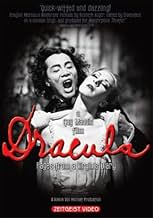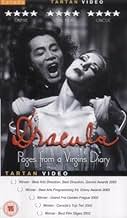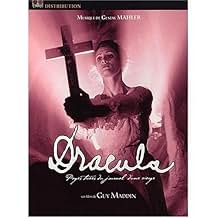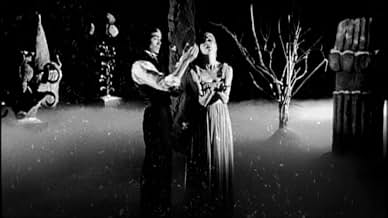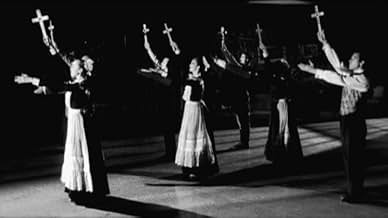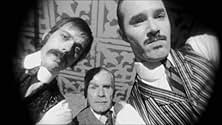IMDb RATING
6.8/10
2.3K
YOUR RATING
A ballet rendition of Bram Stoker's "Dracula", stylized as an Expressionistic silent film.A ballet rendition of Bram Stoker's "Dracula", stylized as an Expressionistic silent film.A ballet rendition of Bram Stoker's "Dracula", stylized as an Expressionistic silent film.
- Awards
- 4 wins & 2 nominations total
Wei-Qiang Zhang
- Dracula
- (as Zhang Wei-Qiang)
Johnny A. Wright
- Jonathon Harker
- (as Johnny Wright)
- Director
- Writers
- All cast & crew
- Production, box office & more at IMDbPro
6.82.3K
1
2
3
4
5
6
7
8
9
10
Featured reviews
In context, this is a pretty amazing DVD.
Had "Dracula: Pages from a Virgin's Diary" been made in Hollywood of with a huge budget, I don't think I would have been as favorably disposed towards the project. After all, the DVD is a bit rough here and there--credits shake a bit and a few of the computer effects (especially superimpositions) are very rough. BUT, you must realize that this is a production of the Royal Winnepeg Ballet. And, while it's a very well-respected and quality production company, it wasn't like these were seasoned filmmakers. So, I cut it a lot of slack. Based on this, it's actually a rather incredible production--with lovely sets, great costumes and a nice Gothic horror/romantic look about it. Heck, I hate opera and I still appreciated the amazing task they did in creating something like this. Probably not for everyone, but using modern dance and ballet, it does make a sophisticated art form more approachable to the masses.
An unlikely pairing
I really had no idea what to expect coming into this film. I had heard basically nothing about it other than it's good ratings, recommendation from Ebert, and I have been interested for a while now in Guy Maddin. This is my first time watching one of his films and I am borderline speechless. I didn't know he primarily works in the silent genre and to top that, this film is entirely a ballet. Filmed in mostly black and white with silent era techniques, Maddin creates and eerie mood with this take on Brom Stoker's classic novel. I've never seen anything quite like it. It sometimes looks like it from the silent era. It's impressive. My one complaint is the jumpy nature of the camera. I was sometimes focused on his dizzying camera work than what was going on, but still a very refreshing and awakening experience.
If you like ballet and like cinema then you'll find you should like this
At the end of the 19th Century, immigrants come into England, not all of them gentle. One such immigrant is the evil Dracula who claims his first victim, Miss Lucy Westenra. Her three suitors call for help from Dr Van Helsing, but it is too late and she turns to vampire. They set out to kill her for good, but can they prevent Dracula claiming his next victim - Westenra's cousin Mina?
As part of my approach to films, I try to not just watch the big new releases or the well known smaller films, but I'll give things a try even if I know little about them but they sound OK. I'll admit that I have been burnt by this on many occasions but this time it worked out for the best. I'm not a big ballet fan, but I enjoyed this film as it mixed the ballet into a story that was told very easily though dance and closed captions. The fact that it was a very cinematic ballet really helped me get into it - the film's style is a homage of sorts to silent film, in it's filming, caption cards and whole look. I like this and it made it more interesting to me. Even the exaggerated looks on he casts' faces reminded me of the silent movies.
The actual ballet in the film is mixed. Some scenes are excellent and flow so very easily, the best by far being Dracula's final dance with Mina. However other parts are not so strong and the motion is not well captured by the camera, which itself seems to want to get in on all the motion and doesn't stay still long enough to really let the eye take in the movement. Happily this is the minority of the scenes as most of it is very nice to watch.
The direction of the ballet is good, but so is the direction of the film. The style captures the silent era well but also has enough clever touches in it to keep it fresh. The tinting of frames and selective use of colour make for interesting flourishes without over doing it. The cast also do reasonably well but are mixed. Zhang is magnificent in both his portrayal of Dracula and his ballet. Most of he rest of the cast do well, but only Birtwhistle (Westenra) and Moroni (Helsing) really stand out for their skills and characters. The support has no weak links in fairness and everyone does what is required of them.
The bottom line is, if you don't like ballet, then you probably won't like this film. If you do like ballet and also like cinema then you should take something from this. For me, I enjoyed the ballet as part of the story telling process but also got a kick out of seeing a silent movie version of Dracula done with modern touches.
As part of my approach to films, I try to not just watch the big new releases or the well known smaller films, but I'll give things a try even if I know little about them but they sound OK. I'll admit that I have been burnt by this on many occasions but this time it worked out for the best. I'm not a big ballet fan, but I enjoyed this film as it mixed the ballet into a story that was told very easily though dance and closed captions. The fact that it was a very cinematic ballet really helped me get into it - the film's style is a homage of sorts to silent film, in it's filming, caption cards and whole look. I like this and it made it more interesting to me. Even the exaggerated looks on he casts' faces reminded me of the silent movies.
The actual ballet in the film is mixed. Some scenes are excellent and flow so very easily, the best by far being Dracula's final dance with Mina. However other parts are not so strong and the motion is not well captured by the camera, which itself seems to want to get in on all the motion and doesn't stay still long enough to really let the eye take in the movement. Happily this is the minority of the scenes as most of it is very nice to watch.
The direction of the ballet is good, but so is the direction of the film. The style captures the silent era well but also has enough clever touches in it to keep it fresh. The tinting of frames and selective use of colour make for interesting flourishes without over doing it. The cast also do reasonably well but are mixed. Zhang is magnificent in both his portrayal of Dracula and his ballet. Most of he rest of the cast do well, but only Birtwhistle (Westenra) and Moroni (Helsing) really stand out for their skills and characters. The support has no weak links in fairness and everyone does what is required of them.
The bottom line is, if you don't like ballet, then you probably won't like this film. If you do like ballet and also like cinema then you should take something from this. For me, I enjoyed the ballet as part of the story telling process but also got a kick out of seeing a silent movie version of Dracula done with modern touches.
Cinematically Erotic
I am completely revising my must see list after watching this. I know only one other of Maddin's projects, his "Saddest Music in the World" of the next year. I rated that in my category of films you must see.
The rules of that list are that no more than two films per year, nor no more than two per filmmaker can be on it. This almost bumped "Talk to Her" off that list. It may yet. Let me advise you now that this is powerful and important stuff, the only successful marriage I know of literature, dance and film. In fact I know few that successfully integrate any two, much less masterpieces in each medium.
The story itself is greatly enriched: all the most terrifying horror is beautiful, and this is: an arc of desire across your life for that hour and a half. Where the original was only about sex, this is written larger to race, money, power and all in an erotic context that transcends sex. You'll notice when seeing this that it is more true to the book than any other filmed version.
Now just think for a moment about this: Dracula has been filmed by Murnau, Browning, Warhol, Herzog, Franco, Coppola and herds of lesser lights. No where has the scope been this broad and sharp.
(The device of the diary has been changed from the detective's to the virgin's, a master concept that indicates the deep thought that went into this. Exposure to that diary makes the girlfriend sex-crazed, for instance, as if the art itself were the infected blood.)
The dance. The choreographer has put together something that is remarkable, even seen merely as a ballet. It uses Mahler's music, by the way. That music is usually so overtly ripe it smells of selfish world conquest. It says something that here it seems merely supportive, that what you see on the screen is bigger.
So the choreography affects powerfully but what matters is the cinematic rendition. This is far more evocative as filmed ballet than a live performance can ever be, because we are allowed to have our eyes dance as participants. When a character's eyes flutter and question, ours do too. When the dance suggests a motion, it is us that completes it or gives it a resting place. The integration of choreography and cinematography is the best I have ever had in my life: beyond the sheer energy of "Red Shoes" to intimacy.
But it is the other cinematic qualities that make this unique. Dracula is a powerful story only because it evokes notions of the past that have power to awaken and live in our souls. Those notions are like the vampire and carried by him in the story. Once we touch them -- have sex with them, we are infected, transformed.
How to convey that cinematically? Why by evoking old film techniques as the story did literary ones. (Today that evocation by hacks is inaptly called "gothic.") So we have a silent film. Actually a postmodern comment on a silent black and white film. Lots of reminders of the camera in cropping and Vaselined lenses. Occasional tinting (blood and lucre), overtly theatrical sound effects, wobbling when we have to move quickly (or die).
The gauzy camera lens is made three dimensional with fog that extends the blur as the camera motion is also made three dimensional by the moving crowd. The whole thing has a phrasing and rhythm that is so well integrated among the dance, light, camera, story and music it is as if the things coevolved from the big bang.
Whoever did the art design deserves a reward. The sets are organic and in the last half in the lair, overtly vaginal -- so overtly it shocks. It must have been drawn at the same time as the choreography.
There's sex and beauty and seduction here. Be seduced my friends. Succumb. Art requires seduction and in the process some infection of urges. It is all about the dance -- Succumb, dance, die.
Ted's Evaluation -- 3 of 3: Worth watching.
The rules of that list are that no more than two films per year, nor no more than two per filmmaker can be on it. This almost bumped "Talk to Her" off that list. It may yet. Let me advise you now that this is powerful and important stuff, the only successful marriage I know of literature, dance and film. In fact I know few that successfully integrate any two, much less masterpieces in each medium.
The story itself is greatly enriched: all the most terrifying horror is beautiful, and this is: an arc of desire across your life for that hour and a half. Where the original was only about sex, this is written larger to race, money, power and all in an erotic context that transcends sex. You'll notice when seeing this that it is more true to the book than any other filmed version.
Now just think for a moment about this: Dracula has been filmed by Murnau, Browning, Warhol, Herzog, Franco, Coppola and herds of lesser lights. No where has the scope been this broad and sharp.
(The device of the diary has been changed from the detective's to the virgin's, a master concept that indicates the deep thought that went into this. Exposure to that diary makes the girlfriend sex-crazed, for instance, as if the art itself were the infected blood.)
The dance. The choreographer has put together something that is remarkable, even seen merely as a ballet. It uses Mahler's music, by the way. That music is usually so overtly ripe it smells of selfish world conquest. It says something that here it seems merely supportive, that what you see on the screen is bigger.
So the choreography affects powerfully but what matters is the cinematic rendition. This is far more evocative as filmed ballet than a live performance can ever be, because we are allowed to have our eyes dance as participants. When a character's eyes flutter and question, ours do too. When the dance suggests a motion, it is us that completes it or gives it a resting place. The integration of choreography and cinematography is the best I have ever had in my life: beyond the sheer energy of "Red Shoes" to intimacy.
But it is the other cinematic qualities that make this unique. Dracula is a powerful story only because it evokes notions of the past that have power to awaken and live in our souls. Those notions are like the vampire and carried by him in the story. Once we touch them -- have sex with them, we are infected, transformed.
How to convey that cinematically? Why by evoking old film techniques as the story did literary ones. (Today that evocation by hacks is inaptly called "gothic.") So we have a silent film. Actually a postmodern comment on a silent black and white film. Lots of reminders of the camera in cropping and Vaselined lenses. Occasional tinting (blood and lucre), overtly theatrical sound effects, wobbling when we have to move quickly (or die).
The gauzy camera lens is made three dimensional with fog that extends the blur as the camera motion is also made three dimensional by the moving crowd. The whole thing has a phrasing and rhythm that is so well integrated among the dance, light, camera, story and music it is as if the things coevolved from the big bang.
Whoever did the art design deserves a reward. The sets are organic and in the last half in the lair, overtly vaginal -- so overtly it shocks. It must have been drawn at the same time as the choreography.
There's sex and beauty and seduction here. Be seduced my friends. Succumb. Art requires seduction and in the process some infection of urges. It is all about the dance -- Succumb, dance, die.
Ted's Evaluation -- 3 of 3: Worth watching.
experiment in ballet and silent film
Lucy Westernra is engaged to marry Lord Arthur Holmwood. However, an evil comes out of the east. She is bitten by Dracula. Vampyr-hunter Abraham Van Helsing arrives to clear out her polluted blood. Mental patient Renfield's escape leads to a massacre. Dracula reanimates Lucy. Van Helsing and the men hunt for Lucy and then finally Dracula himself.
Filmmaker Guy Maddin continues his experimentation. This is mostly black and white with splashes of bright colors. It is a silent film with many of its conventions such as title cards and era appropriate special effects. The ballet dancing can be hypnotic. The story follows the traditional Bram Stoker's Dracula with its xenophobia. It is definitely not for everyone and my fascination with the movie does wear out in the second half. Nevertheless, this is a worthy experiment.
Filmmaker Guy Maddin continues his experimentation. This is mostly black and white with splashes of bright colors. It is a silent film with many of its conventions such as title cards and era appropriate special effects. The ballet dancing can be hypnotic. The story follows the traditional Bram Stoker's Dracula with its xenophobia. It is definitely not for everyone and my fascination with the movie does wear out in the second half. Nevertheless, this is a worthy experiment.
Did you know
- TriviaSarah Murphy-Dyson's debut.
- ConnectionsReferenced in Guy Maddin: His Winnipeg (2014)
- SoundtracksSymphony #1 (excerpts)
By Gustav Mahler
- How long is Dracula: Pages from a Virgin's Diary?Powered by Alexa
Details
- Release date
- Country of origin
- Official site
- Language
- Also known as
- Drácula - El diario de una virgen
- Filming locations
- Production companies
- See more company credits at IMDbPro
Box office
- Budget
- $1,600,000 (estimated)
- Gross US & Canada
- $55,365
- Opening weekend US & Canada
- $4,784
- May 18, 2003
- Gross worldwide
- $55,365
- Runtime
- 1h 13m(73 min)
- Color
- Sound mix
- Aspect ratio
- 1.85 : 1
Contribute to this page
Suggest an edit or add missing content

